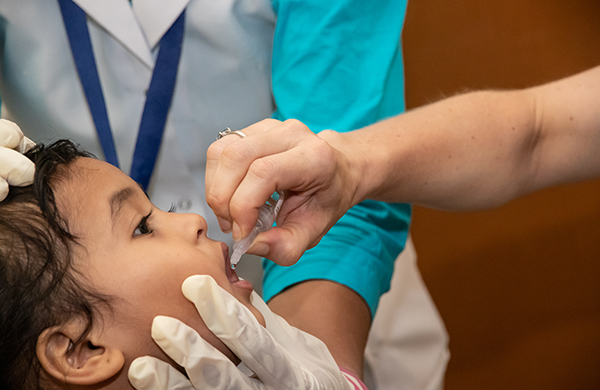By Jessica Malaty Rivera —

In the last five years, the world has had a crash course in public health. A flurry of scientific jargon-filled headlines has caused a fair amount of confusion, panic, and fear. This dynamic is not new, and, in fact, it has a name in epidemiology: infodemic.
Epidemiology asks us where, when, why, and to whom a disease is spreading, and how it impacts population health. Infodemiology asks those same questions but about the information that is spreading, and how it impacts population decision-making.
Think of it this way: infodemics are to infodemiology as epidemics are to epidemiology.
Infodemics don’t necessarily mean an outbreak of all bad information. Sometimes, it’s just too much information, making it difficult for people to navigate information landscapes for trustworthy information from trusted sources. This is acutely true in the world of vaccines.
Vaccine misinformation–which has shattered trust, stalled vaccination campaigns, resulted in the reemergence of previously eliminated diseases and threatened global health security–is moving faster and farther because of our digital information ecosystems. As we look toward the future, building infodemic resilience must be a top priority for public health systems, policymakers, and communities alike.
What is Infodemic Resilience?
Infodemic resilience refers to a society’s capacity to withstand, identify, and respond to false or misleading health information, especially during public health emergencies. It’s not just about fact-checking or debunking false claims—it’s about building critical thinking, trust, and communication infrastructures that can filter out noise and amplify credible voices. In the context of vaccines, this means protecting people from dangerous misinformation that leads to vaccine hesitancy, refusal, and, ultimately, preventable illness and death.
The High Cost of Vaccine Misinformation
The consequences of unchecked vaccine misinformation are both immediate and long-term. We’ve seen measles and pertussis outbreaks in communities with low vaccine uptake, resistance to COVID-19 vaccines despite overwhelming scientific evidence, and a resurgence of vaccine-preventable diseases in areas where misinformation thrives.
These outcomes don’t just affect individuals—they weaken herd immunity (vaccination rates to reduce transmission), overwhelm healthcare systems, and lead to avoidable loss of life. Moreover, they disproportionately affect marginalized communities and those who are immunocompromised or medically fragile. Misinformation, when left unchallenged, becomes a form of health inequity.
Why We Need to Act Now
The digital ecosystem is evolving quickly. Social media platforms have made it easy for misleading content to go viral within seconds. Algorithms often favor emotionally charged content—fear, outrage, or conspiracy—over nuanced, evidence-based information. While tech companies bear responsibility, we can’t rely solely on content moderation. We need proactive, not just reactive, science communication. Resilience isn’t built in a crisis—it’s built before the next one hits. With future pandemics likely and ongoing public health campaigns for routine immunizations, our ability to respond effectively depends on how well we can communicate and foster trust. Here are some strategies to help build infodemic resilence:
- Invest in health and data literacy
Public health messaging needs to go beyond “what” and explain the “why.” People are more likely to trust information they understand and how it affects them.
- Partner with trusted messengers
Local leaders, healthcare workers, faith leaders, and even influencers can be powerful storytellers and allies in promoting accurate vaccine information. People trust people far more than institutions. Training and equipping these voices can dramatically expand the reach of public health messaging.
- Prioritize transparent and compassionate communication
Shaming or ridiculing those who believe misinformation rarely changes minds. We need empathetic communication that validates concerns, addresses fears, and provides clear, consistent facts without judgment.
- Policy support and global collaboration
Rotary, Shot at Life, UNICEF, WHO, and other global bodies have laid the groundwork to address current challenges and protect against the threat of future infodemics though public engagement, raising awareness, and encouraging governments to adopt policies that promote transparency and encourage collaboration between public health institutions and and tech platforms.
Infodemic resilience isn’t just the responsibility of public health professionals—it’s a societal challenge. Parents, educators, journalists, scientists, tech workers, and community leaders all play a role in shaping the information environment. In the fight against infectious diseases, vaccines save lives, but only if people trust them. That trust depends on the stories people hear, the information they access, and the communities they live in. By building infodemic resilience, we create a stronger, healthier, and more informed society—one that can face the next health crisis not with confusion, but with confidence.
Jessica Malaty Rivera is an infectious disease epidemiologist and award-winning science communicator. She has dedicated the last 20 years of her career to emerging disease surveillance, public health policy, and vaccine advocacy. Her specialty is in translating complex scientific concepts into impactful, judgement-free, and accessible information for diverse audiences. Find her on Instagram @jessicamalatyrivera and Substack @makingsciencemakesense.

https://blog.rotary.org/2025/04/22/building-infodemic-resilience-a-public-health-imperative-in-the-age-of-vaccine-misinformation/

